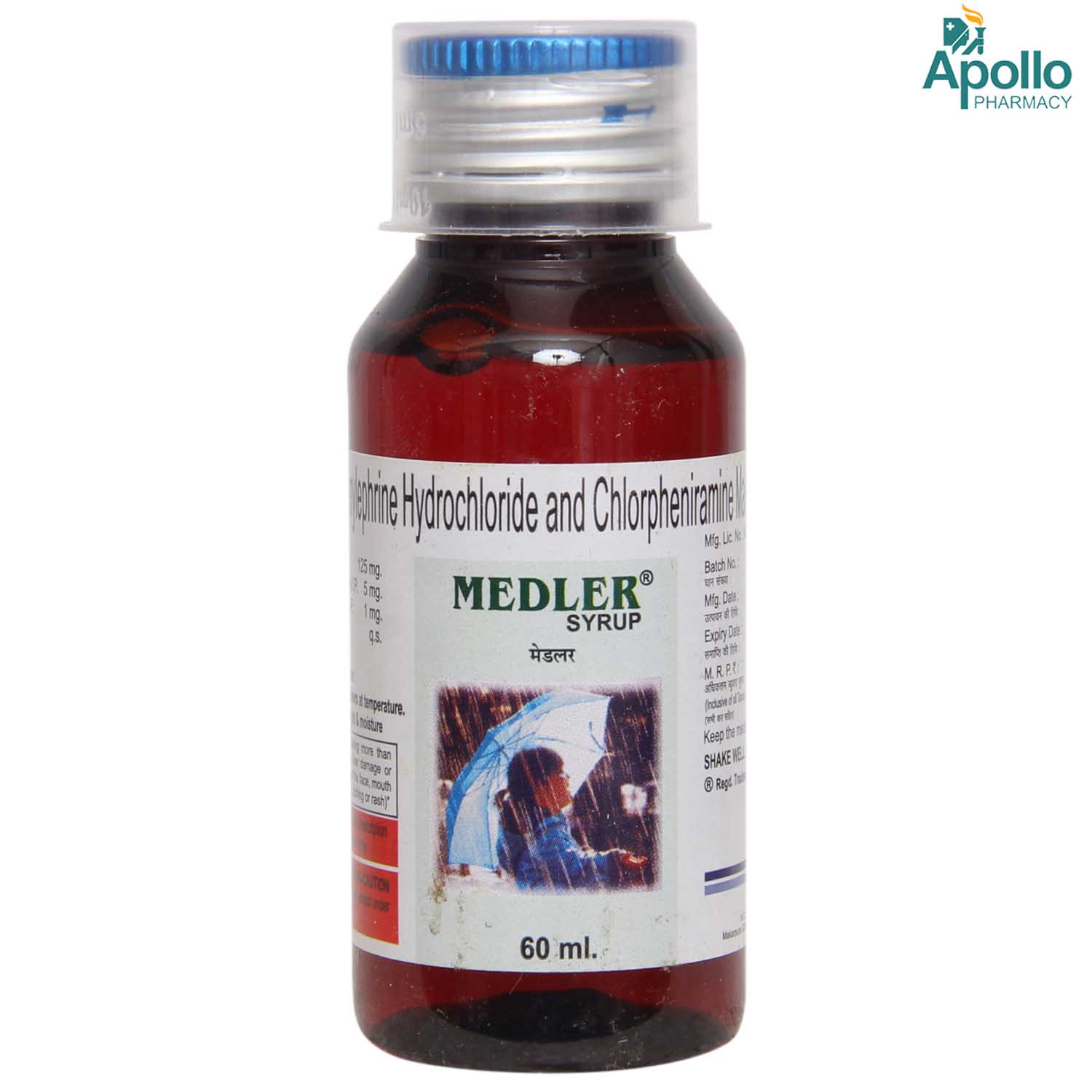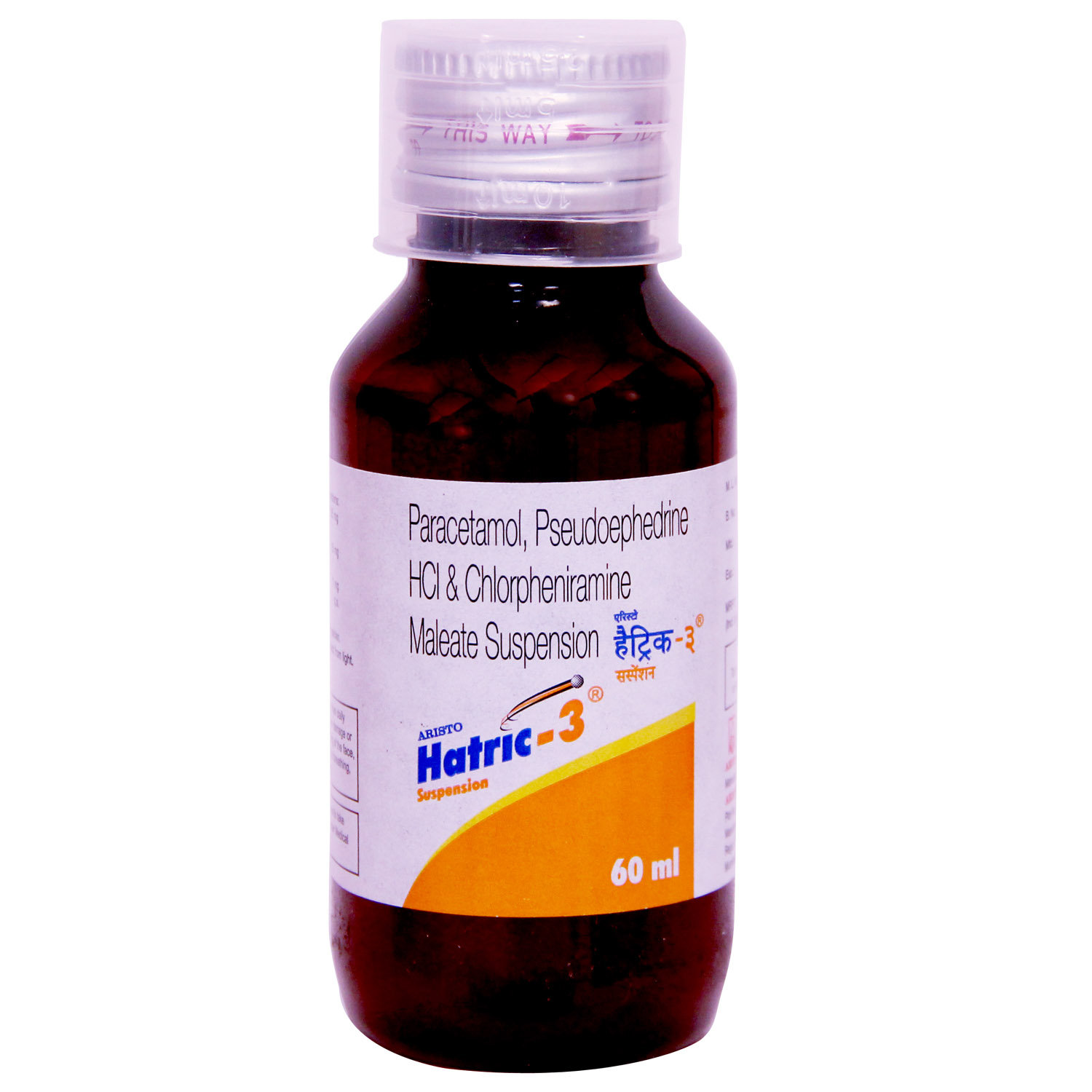Chlorpheniramine+pseudoephedrine
About Chlorpheniramine+pseudoephedrine
Chlorpheniramine+pseudoephedrine is a respiratory medication primarily used to treat common cold symptoms and allergies such as sneezing, runny nose, nasal and sinus congestion, stuffy nose or watery eyes. The common cold is a respiratory illness that affects the nose and throat and is caused by viruses known as 'rhinoviruses'. The virus enters the body through the nose, mouth or eyes and spreads quickly through air droplets when a sick person sneezes, coughs or talks.
Chlorpheniramine+pseudoephedrine consists of Chlorpheniramine (antihistamine) and Pseudoephedrine (decongestant). Chlorpheniramine belongs to the class of antihistamines or anti-allergic that works by blocking the action of histamine, a substance responsible for causing allergic reactions. It helps to provide relief from allergy symptoms such as sneezing, running nose, watery eyes, itching, swelling and congestion or stiffness. On the other hand, Pseudoephedrine belongs to the class of decongestant drugs. Works by narrowing small blood vessels in your nose. This helps mucus and air flow freely in the cavities in your nose (sinuses), helping you breathe more easily. Altogether Chlorpheniramine+pseudoephedrine relieves the symptoms from common cold symptoms.
Chlorpheniramine+pseudoephedrine is available in the form of oral syrup and tablets. Take Chlorpheniramine+pseudoephedrine with or without food as advised by your doctor with the help of a measuring cup. Your doctor will recommend how often you take Chlorpheniramine+pseudoephedrine based on your medical condition. Do not stop taking Chlorpheniramine+pseudoephedrine on your own until the doctor advises you. Some people may experience dry mouth, throat or nose, drowsiness, constipation, dizziness, blurred vision, restlessness or excitation. Most of these side effects of Chlorpheniramine+pseudoephedrine do not require medical attention and gradually resolve over time. However, if the side effects persist or worsen, please consult your doctor.
Please tell your doctor if you are allergic to Chlorpheniramine+pseudoephedrine or any other medicines. If you are pregnant or breastfeeding, it is advised to inform your doctor before using Chlorpheniramine+pseudoephedrine. Chlorpheniramine+pseudoephedrine is not recommended for children below four years of age. If you are about to undergo medical tests or surgery, please inform your doctor that you are taking Chlorpheniramine+pseudoephedrine. Avoid using Chlorpheniramine+pseudoephedrine if you have taken medicines such as linezolid, phenelzine, selegiline, rasagiline, isocarboxazid, tranylcypromine and methylene blue injection in the past 14 days. Drink plenty of fluids while taking Chlorpheniramine+pseudoephedrine to loosen mucus. If you have glaucoma, urinary problems, enlarged prostate, phenylketonuria (a congenital disability that causes accumulation of amino acid, phenylalanine in the body), cough with mucus or cough caused by asthma, smoking, chronic bronchitis or emphysema (a lung condition causing shortness of breath). Avoid alcohol while taking Chlorpheniramine+pseudoephedrine, since it can worsen the side effects like dizziness and sleepiness.
Uses of Chlorpheniramine+pseudoephedrine
Medicinal Benefits
Chlorpheniramine+pseudoephedrine is a combination of two drugs: Chlorpheniramine and Pseudoephedrine, primarily used to treat the common cold. Chlorpheniramine belongs to the class of antihistamines (anti-allergic drugs) that works by blocking the action of histamine, a substance responsible for causing allergic reactions. It helps provide relief from allergy symptoms such as sneezing, running nose, watery eyes, itching, swelling, congestion or stiffness. Pseudoephedrine belongs to the class of decongestant drugs. Works by narrowing small blood vessels in your nose. This helps mucus and airflow freely in the cavities in your nose (sinuses), helping you breathe more easily. Altogether Chlorpheniramine+pseudoephedrine relieves the symptoms from common cold symptoms.
Directions for Use
Storage
Side Effects of Chlorpheniramine+pseudoephedrine
- Dry mouth
- Throat or nose
- Drowsiness
- Blurred vision
- Headache
- Constipation
- Dizziness
- Restlessness or excitation
Drug Warnings
Please tell your doctor if you are allergic to Chlorpheniramine+pseudoephedrine or any other medicines. If you are pregnant or breastfeeding, it is advised to inform your doctor before using Chlorpheniramine+pseudoephedrine. Chlorpheniramine+pseudoephedrine is not recommended for children below 4 years of age. If you are about to undergo medical tests or surgery, please inform your doctor that you are taking Chlorpheniramine+pseudoephedrine. Avoid using Chlorpheniramine+pseudoephedrine if you have taken medicines such as linezolid, phenelzine, selegiline, rasagiline, isocarboxazid, tranylcypromine and methylene blue injection in the past 14 days. Drink plenty of fluids while taking Chlorpheniramine+pseudoephedrine to loosen mucus. If you have glaucoma, urinary problems, enlarged prostate, phenylketonuria (a birth defect that causes accumulation of amino acid, phenylalanine in the body), cough with mucus or cough caused by asthma, smoking, chronic bronchitis or emphysema (a lung condition causing shortness of breath), inform your doctor before taking Chlorpheniramine+pseudoephedrine.
Drug Interactions
Drug-Drug Interactions: Chlorpheniramine+pseudoephedrine may interact with MAO inhibitors (isocarboxazid, linezolid, methylene blue, moclobemide, phenelzine, procarbazine, rasagiline, safinamide, selegiline, tranylcypromine), antidepressant medications (amitriptyline, phenelzine), anti-epilepsy medication (phenytoin), migraine medications (ergotamine), medicines used for heart failure (digoxin), antihistamines applied to the skin (diphenhydramine cream, ointment, spray), sleep or anxiety (alprazolam, lorazepam, zolpidem), muscle relaxants ( carisoprodol, cyclobenzaprine).
Drug-Food Interactions: Chlorpheniramine+pseudoephedrine may interact with alcohol. Therefore, avoid alcohol consumption with Chlorpheniramine+pseudoephedrine as it may increase the risk of adverse effects such as drowsiness, dizziness or difficulty concentrating.
Drug-Disease Interactions: If you have glaucoma, urinary problems, epilepsy, enlarged prostate, phenylketonuria (a congenital disability that causes accumulation of amino acid, phenylalanine in the body), cough with mucus or cough caused by asthma, smoking, chronic bronchitis or emphysema (a lung condition causing shortness of breath), inform your doctor before taking Chlorpheniramine+pseudoephedrine.
Drug-Drug Interactions Checker List:
Safety Advice

Alcohol
unsafeIt is advised to avoid consuming alcohol with Chlorpheniramine+pseudoephedrine as it could lead to increased drowsiness or dizziness.

Pregnancy
unsafeThere is limited data on how Chlorpheniramine+pseudoephedrine affects pregnancy. Chlorpheniramine+pseudoephedrine may be unsafe to use during pregnancy since it may show harmful effects on the developing baby. Consult your doctor before using Chlorpheniramine+pseudoephedrine, if you are pregnant or planning to conceive.

Breast Feeding
cautionChlorpheniramine+pseudoephedrine may be unsafe to use during breastfeeding since it has Chlorpheniramine, an anti-histamine drug that may pass into breast milk and harm the baby. Please consult your doctor before starting Chlorpheniramine+pseudoephedrine.

Driving
cautionDo not drive or operate machinery if you experience sleepiness, dizziness and shakiness while using Chlorpheniramine+pseudoephedrine. This may affect your ability to drive. Seek medical attention if the symptoms persist longer.

Liver
cautionChlorpheniramine+pseudoephedrine should be used with caution in patients with liver diseases. Let your doctor know if you have any history of liver diseases or hepatic impairment. Your doctor may adjust the dose or prescribe a suitable alternative based on your condition.

Kidney
cautionChlorpheniramine+pseudoephedrine should be used with caution in patients with kidney diseases. Let your doctor know if you have any history of kidney diseases. Your doctor will weigh the benefits and potential risks before prescribing Chlorpheniramine+pseudoephedrine.

Children
cautionChlorpheniramine+pseudoephedrine is not recommended for children less than four years of age. However, it can be given to children above four years of age if prescribed by a doctor.
Habit Forming
Diet & Lifestyle Advise
- Avoid dairy products such as milk, as it may increase mucus production. Also, avoid processed or refined foods to have relief from cough. Instead, replace baked foods, fried foods, white bread, white pasta, French fries, sugary desserts and chips with green leafy vegetables.
- Drink plenty of fluids to avoid dry throat while you have a cough and loosen mucus.
- Avoid citrus fruits as it may worsen the cough. Eat fruits rich in water content, such as pears, watermelon, peaches and pineapples.
- Know your triggers like allergens, such as pollen, dust and food items that make your asthma and other respiratory diseases severe.
- Quit smoking and avoid passive smoking. Smoking may reduce the effectiveness of the medicine.
- Drink warm fluids while you take Chlorpheniramine+pseudoephedrine to help loosen congestion and lubricate the throat.
- Eat a healthy diet and exercise regularly to strengthen your breathing muscles and boost your immune system.
- Learning breathing exercises will help you move more air in and out of your lungs.
- Avoid consumption of alcohol with Chlorpheniramine+pseudoephedrine as it may cause tiredness, drowsiness or lack of concentration.
Special Advise
- Do not use Chlorpheniramine+pseudoephedrine only to make a child sleepy.
- Contact the doctor if your symptoms do not improve even after 7 days.
- Contact the doctor immediately if you develop fever, rash, or headaches after taking Chlorpheniramine+pseudoephedrine.
- Regular eye checkups in patients with glaucoma.
Patients Concern
Disease/Condition Glossary
Common cold: The common cold is an infection caused by viruses, primarily 'rhinoviruses' that affect your nose and throat (upper respiratory tract). Children under six are at the greatest risk of catching a cold, but healthy adults can also catch 2-3 colds per year. Most people recover from cold symptoms within a week or ten days. Symptoms may last longer in people who smoke or are exposed to allergens such as dust, pollutants, and so on. Stuffy or runny nose, sore throat, cough, congestion, mild body pain or a mild headache, sneezing, low-grade fever, and feeling unwell are all common cold symptoms (malaise).
FAQs
Yes, Chlorpheniramine+pseudoephedrine may cause dry mouth as a temporary side effect in some people. It is not necessary for everyone taking Chlorpheniramine+pseudoephedrine to experience this side effect. However, to avoid such side effects, drink plenty of water, regularly rinse your mouth, practice good oral hygiene and suck on sugarless candy. However, if the condition persists or worsens, please consult a doctor.
Chlorpheniramine+pseudoephedrine is not recommended for use in patients with prostate enlargement, since Pseudoephedrine may cause or worsen urinary difficulty in patients with prostate enlargement. It is advised to consult your doctor before using Chlorpheniramine+pseudoephedrine.
No, you are not recommended to stop taking Chlorpheniramine+pseudoephedrine without consulting your doctor as it may worsen the condition or cause recurring symptoms. Therefore, take Chlorpheniramine+pseudoephedrine for as long as your doctor has prescribed it, and if you experience any difficulty while taking Chlorpheniramine+pseudoephedrine, please consult your doctor.
Take the missed dose as soon as possible. However, if it is time for the next dose, skip the missed dose and go back to your regular dosing schedule.
Chlorpheniramine+pseudoephedrine consists of two medicines: Chlorpheniramine and Pseudoephedrine. Chlorpheniramine belongs to the class of antihistamines or anti-allergic that works by blocking the action of histamine, a substance responsible for causing allergic reactions. It helps provide relief from allergy symptoms such as sneezing, running nose, watery eyes, itching, swelling, congestion or stiffness. On the other hand, Pseudoephedrine belongs to the class of decongestant drugs. Works by narrowing of small blood vessels in your nose. This helps mucus and airflow freely in the cavities in your nose (sinuses), helping you breathe more easily. Altogether it relieves the symptoms from common cold symptoms.







